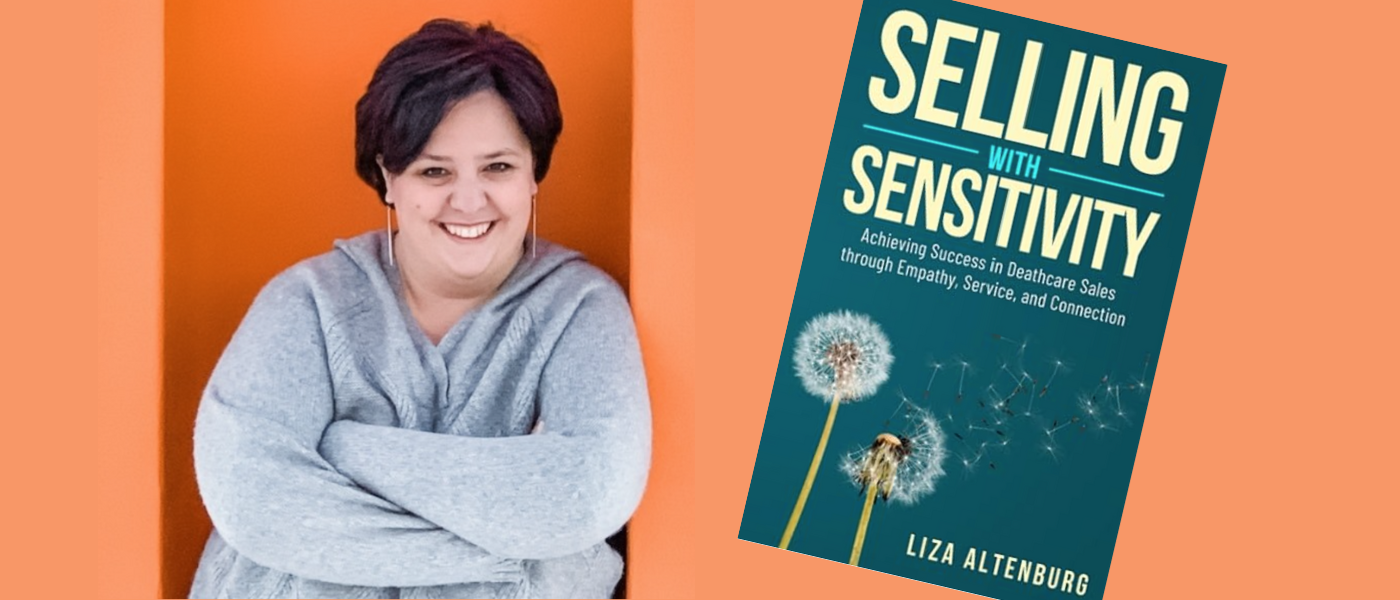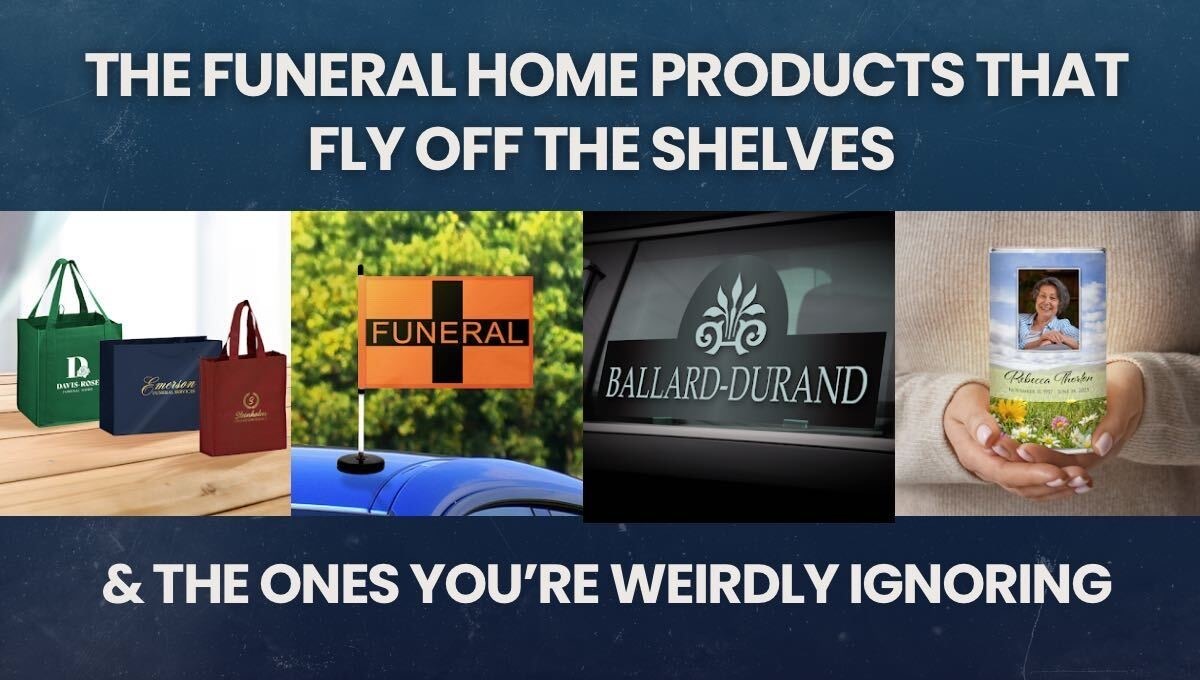Liza Altenburg’s Selling With Sensitivity Simplifies Sales for Deathcare Professionals
Ask any funeral director to name their favorite task within the profession, and we’ll bet not many — if any — will say “selling.” Yet, selling is vital to the success and survival of any business, even deathcare. And according to Liza Altenburg, author of the 2023 book Selling With Sensitivity, it’s a skill you can easily master by leveraging the very traits that help you excel in serving families.
“The scariest thing that we can think of is being perceived as ‘salesy,’” Altenburg says. “And that’s what we as modern deathcare professionals have to overcome. And we do that one family at a time. We do that with integrity at the forefront. We do that by leading and making sure we’re taking care of each family the way that we need to be taken care of when we’re going through the most vulnerable moments of our own lives.”
Speaking from experience
The subtitle of Altenburg’s book, Achieving Success in Deathcare Sales Through Empathy, Service, and Connection, is an apt summary of her sales philosophy — and it’s a formula that she has proven to be effective throughout her own career in deathcare. As manager of two Detroit-area Park Lawn cemeteries, Altenburg is building a “dream team” of professionals who routinely earn six-figure incomes thanks to her competency-based sales approach. And she’s not ashamed of giving them that lofty income goal.
“They’ll earn that income not because they push or they twist anybody’s arms, but it’s because they serve,” she explains. “There’s no shame in earning a living based on that. It’s a balance. Without compassion, our competency means nothing, because we’d just be really skilled salespeople who can get anybody to buy anything. But by the same token, without that competency, our compassion means nothing, because then we’re just sort of sappy wet rags hanging around. We’re comfortable, but we’re really not worth anything.”
Altenburg’s strategy for successful selling with sensitivity wasn’t created overnight. Before entering the deathcare arena, she spent 20 years in what she refers to as “fun sales” — selling products like makeup, jewelry, and purses that people usually enjoy and look forward to buying. It wasn’t until her father passed away that she “fell in love” with her current profession.
“It was very traumatic, and sudden, and unexpected,” she recalls. “Just like the vast majority of us in Western society, he never wanted to talk about death, and I certainly didn’t want to talk about it. So we never did. As the only child, everything fell on me. And it was just so much more chaotic than it needed to be. So fast forward to me coming into the cemetery world and learning that it didn’t have to be that way.”
Compassion, not chaos
Altenburg explains that the chaos she experienced while taking care of her father’s arrangements could have been avoided with some simple conversations and planning. And she wanted to be the one who helped families do that.
“Within three or four months of working [in deathcare], I decided I’d never go back to those ‘fun sales,’” she says. “I would always work in the deathcare world. And it became very healing for me to be able to help families to make their own plans in advance because I knew what I was helping them to protect themselves and the people they love from.”
As Altenburg began building her sales team, she knew that they would have to be able to recognize a family’s needs, help them make decisions, and communicate on an appropriate level. To find people who would excel in these areas, she turned to a tried-and-true method she’d utilized when hiring salespeople in her previous profession: Behavioral assessments.
“Myers-Briggs on steroids”
Behavioral assessments are frequently used in the hiring process because they can help an employer not only uncover an applicant’s behavioral traits, but also explain why they behave the way they do and predict how they’ll react in certain situations. This helps the employer better understand how a person interacts with others, how to best interact with them, and in what roles the person will flourish.
“Behavioral assessments have always been a part of what I’ve done,” she says. “I’ve utilized them to grow sales teams in the past, but coming into deathcare … Oh my gosh. Do they matter here? Maybe more so than anywhere else I have worked.”
Altenburg’s preferred assessment is based on the DISC model, which categorizes individuals on their dominance, influence, steadiness, and conscientiousness. She is certified to administer and evaluate the assessment using the Maxwell Method, which is a “comprehensive approach to understanding and applying the DISC model” that “combines the insights of renowned leadership expert John C. Maxwell with the proven DISC assessment framework to provide a powerful tool for personal and professional development.”
“I talk about this being Myers-Briggs on steroids,” Altenburg says. “It’s behavior-based more than preference-based like Myers-Briggs. This is what I prefer; it’s a little more concrete. It tells me how someone will ‘show up.’”
How it works in sales
Knowing how a person will “show up,” or present themselves to others, is key to being able to communicate with the families served by the deathcare profession. Salespeople who are exposed to the DISC method are able to adjust their approach to another person based on the other person’s presentation. In other words, they learn how to communicate with the person the way the person wants to be communicated with.
Altenburg says that thanks to their training, her team members can quickly tweak their selling approach as soon as a family comes into the office. For example, they can gauge whether they will need to present something to a family with a quick, just-the-facts technique or if the family would prefer the salesperson to explain each detail in the contract.
“The behavior assessments, and knowing ourselves and knowing how to communicate with others based on that is a huge part of what we do,” Altenburg says. “We have to live there in the emotion, and we can’t turn off our empathy or feelings because we have to sell. This is not a logical thing people buy; this is an emotional thing people buy.”
She explains that the tools provided by the assessment’s results can identify someone, for example, as a “high I” (Influencer), or a “people person,” which is how Altenburg herself scores on the DISC.
“I know that as a high I, I will need to slow down and when talking to someone who is a C,” which is someone who scores higher on the conscientiousness trait, she explains. “They will be very detail-focused, and will need to know the answers to everything before they make a decision. I’ll need to slow down, while someone who is the complete opposite of me might need to focus on not getting frustrated with all the questions they know will be asked.”
Following the rule
To Altenburg, this all boils down to learning how to influence others in a gentler, more effective way, and ensure that they’re communicated with in the way they prefer and will respond to.
“The Golden Rule is ‘Do unto others the way you would want others to do unto you,’” she says. “But I always think about taking it to the next level, which some have called the Platinum Rule: ‘Communicate with others the way that they need to be communicated with, not the way that you need to be communicated with.’”
The stories Altenburg has collected over her years observing this rule in a deathcare setting culminated this year in her book, Selling With Sensitivity. She says the principles she learned from applying the DISC method to sales and the stories themselves “led the way” to the book coming together.
However, her book isn’t exclusively about using behavioral assessments to adapt to the families you serve. It also offers plenty of tips, tricks, and recommendations for successful selling.
“A big part of excelling in deathcare sales is simply softening our vocabularies,” she explains. “I think in this industry we get hardened a little bit to some of the things we see and hear every day. And it gets easy to forget that for the people we talk to, this is a once-in-a-lifetime thing for them, even though we’ve done it 100 times before. So we need to talk about benefits, not features or logistics. A family doesn’t care that a niche is 12x12x12. A family cares that that particular niche is big enough to take care of their mom and dad and they can be together there forever.”
A special offer for Connecting Directors readers
Because the information in Selling With Sensitivity can be such a game-changer for deathcare professionals involved in sales, Altenburg is willing to offer Connecting Directors readers an excellent opportunity to bring the techniques to their own teams.
“Any sales leader who orders 10 or more books will receive a complimentary author chat session with them and their team,” she says. “It can be virtually, or in-person if they’re located near me, and we will talk about whatever that leader thinks their team needs most. It could be overcoming objections, identifying and marketing to their ideal client, or being assertive without being aggressive. We can work together to decide what that conversation needs to look like.”
If you’re interested in taking Liza Altenburg up on her generous offer, please reach out to her today at liza.altenburg@gmail.com, by phone at 734-558-3208, or at https://lizaaltenburg.com/contact/.




